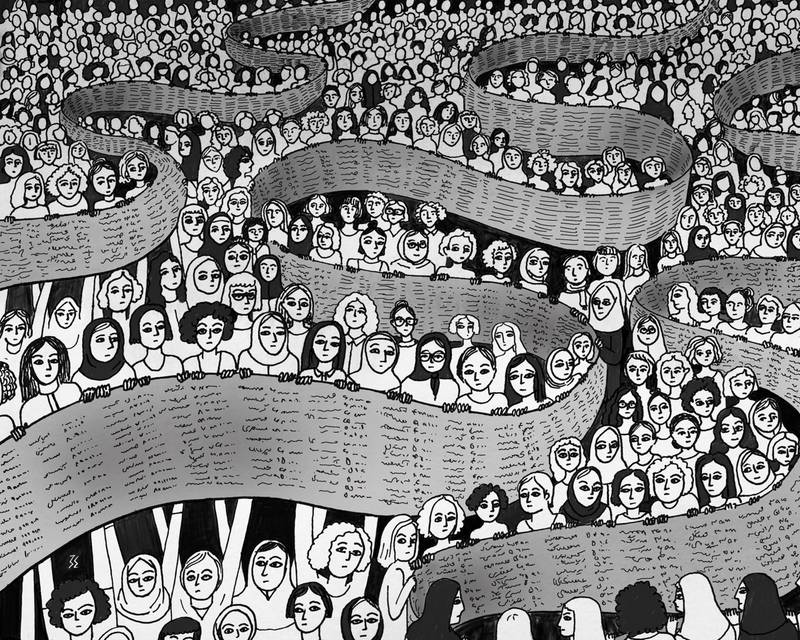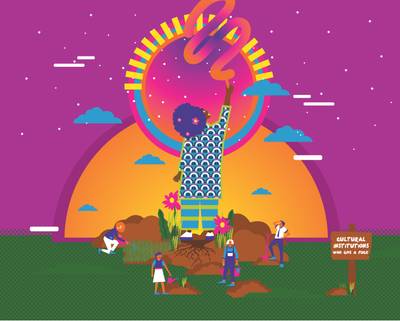

We cannot use geography as the perimeter for cultural exchange; instead, we should look at the space where the exchange takes place. Who is curating, producing and inviting these artists? These are central questions defining whether the transference is cultural exchange or not. In this essay, I deconstruct the ‘power dynamics of cultural exchange’ from the perspective of Gambian and Senegalese artists and elaborate on how the room, respect, celebration, identity and negotiation play a pivotal role in cultural exchange.
READFrom Periphery to Center: Deconstructing the Power Dynamics of Cultural Exchange
We love to talk about mutual respect and celebrating art, so what does that mean in the context of Cultural Exchange? The art field is often viewed as progressive when it comes to inclusion, but is it?
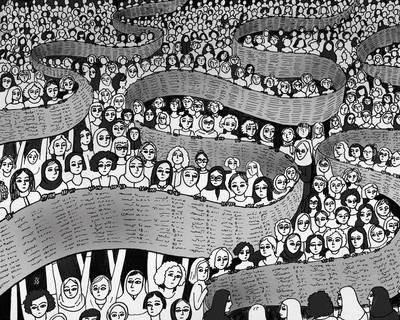

These methods, besides protesting and street face-to-face talking and gathering signatures, were necessary to undo the normality of discrimination and patriarchy. The one million signature campaign brought a reviving soul into Iran’s feminist movement and civil society by bringing the challenge to homes, families, streets, and every public space, such as buses, parks, and workspaces. Face-to-face conversations would bring deep conversations, many personal stories and many more people to join the movement.
READWe Change: On the Processes of Iran’s One Million Signature Campaign
Iran’s women-led One Million Signatures Campaign for the Reform of Discriminatory Laws was an extraordinary phenomenon. What you read here is a personal reflection on the democratic, nonhierarchical, open, and evolving organising processes of this campaign.
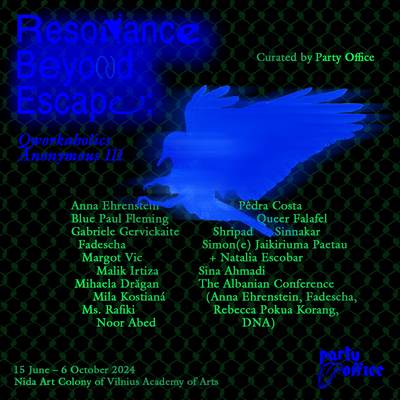

The experiences narrated in the exhibition seek to reshape these power dynamics and effect a decolonization from a Western anthropological gaze that is as exhausting and draining as any other toxic work environment. But is this comparison even adequate given that the Qworkaholics’ relationship with the outside world is suffused with oppression and social mistreatment at the most basic (desire, instinct, sensibility) level? How can these relationships be reshaped if burnout is at the very core of one’s existence, not just a part of it?
READAnarchitecture of Desire: A Review of Resonance Beyond Escape – Qworkaholics Anonymous III
Qworkaholics are victims of various colonial systems of power whose “primary occupation” is the struggle for survival in the present-day world, which systematically is “othering” them, subjecting their bodies, identities and affects to daily violence and oppression. Can the mundane drudgery of Western consumer culture that is oppressive and exploitative as the colonial systems be challenged through visual and physical forms that reflect the actual choreography of living and sensing?
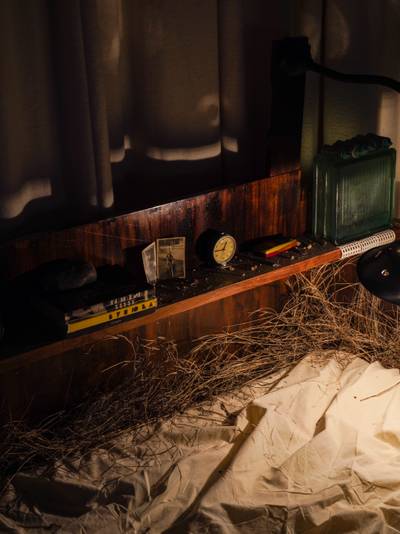

Bulgaria as a space and a nation had a profound impact on the way I embody myself and shaped and reshaped my sense of national identity. To this day, I remember sitting on my grandmother’s lap in 2006 on New Year’s Eve in my house, awaiting the beginning of the new chapter in Bulgarian history—our ascension to the European Union. For a country that was not a direct participant in the colonial project of Western Europe and so often described as a part of the “margins” of Europe, this geography, which I was living in, would finally be put on the world map. Or so I believed.
READBulgarian Pavillion’s ‘The Neighbours’: Bridging the Memory Archipelago of the Bulgarian Communist Past
This is not a review of the Bulgarian pavilion but a challenge to deal with history’s silences, recognize my family’s past, and find the connections and bridges between my two bodies. One seeing and one actively articulating my positionality in the world in relation to the notion of nationhood, identity and language, which I was prescribed — Bulgarian Turkish.
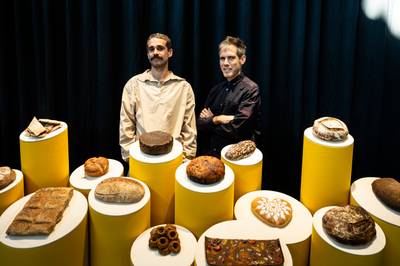

Cooking Sections’ recent visit to Finland was centred around the IHME Helsinki Commission 2024 Maaleipä Challenge, which invited home bakers, bakeries, restaurants, schools, and communities in Finland to create bread recipes that combine the well-being of land, water and people’s guts. Cooking Sections’ projects use food as a medium to question global food production and also confront the inequities within food systems. The core of their modus operandi is gathering the latest scientific knowledge by meeting researchers and experienced experts.
READRethinking (Climate) Security Through Food: An Interview with Cooking Sections
Ines Montalvao talks to Cooking Sections about the impact of linking food to broader definitions of security and resilience through projects that challenge global food systems and engage local ecologies and communities to inspire change.
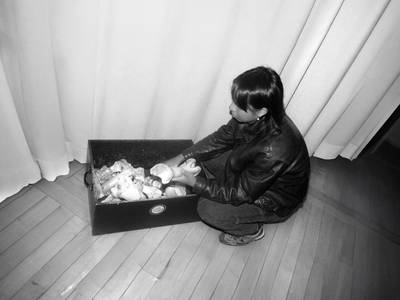

I use the exhibition as a medium, both as a context that guides my research and the creation of works as a documentation of this process. It is always an unknown process, I can’t decide what I encounter, and therefore, the selection of the works becomes very intuitive and, hence, uncertain. But of course, decisions are always made, so the ghosts arrive with them. There isn’t any exhibition, archive, or museum that is not haunted by ghosts, it’s all about one’s intentions and a certain awareness.
READA Tender Meandering, Daydreaming in Archives: An Interview with Xiao Zhiyu
Vinayak interviews artist Xiao Zhiyu at the site of his exhibition Layered hills send off glimmering light at the Helsinki Art Museum to find out more about their process and strategies used in exhibition making as practice.
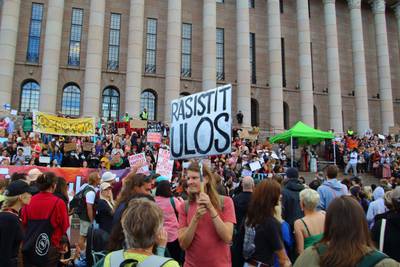

Prejudiced, racist attitudes are, of course, still a part of this problem, but crucially, they are just one part. Global white supremacy is a far bigger structure – a political and economic system that transcends national borders and shapes most of the world. Problematising it this way implies a need for much bigger solutions than simply educating people out of their prejudiced attitudes. It means completely restructuring – or indeed dismantling – those economic and political systems that maintain the supremacy of whites over non-whites.
READProblematising ‘Right-wing Extremism’: Analysing White Supremacy and Government Responses to Racist Violence
This paper examines the responses of government ministers to the racist attacks in Oulu in the 2024 summer, Finland. It problematises the idea of ‘right-wing extremism’ as a security threat, explores some of the limitations and adverse effects of this problem representation, proposing new ways of understanding and responding to such violence.
